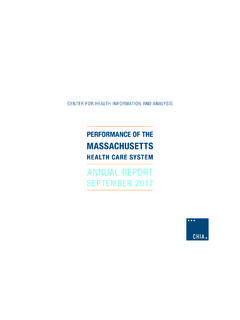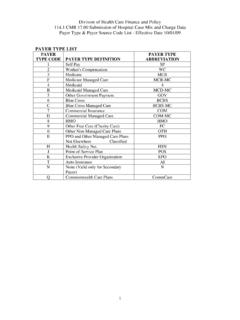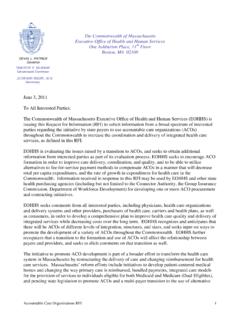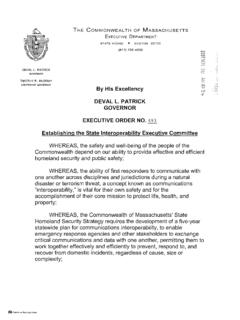Transcription of Commonwealth of Massachusetts Executive Office of Health ...
1 1 Commonwealth ofMassachusettsExecutive Office of Health and Human ServicesED Length of Stay Issuesfor Behavioral Health Patients: Update2 Overview EOHHS is committed to addressing the problem of behavioral Health patients in emergencydepartments who face long delays waiting for disposition to appropriate settings forbehavioral Health care EOHHS has reviewed information on this topic, including information provided bystakeholders, data reported by hospitals to the Department of Public Health , and studiespublished in the academic literature EOHHS has identified strategies that could potentially improve the care system for behavioralhealth patients EOHHS obtained stakeholder feedback on a number of different strategies.
2 And would like toprovide an update on these initiatives at this time3 Review Background Care system for Behavioral Health patients Policy statement Strategies for discussion4 Background Delays for behavioral Health patients awaiting disposition from EDs to appropriate settings isa national problem: A 2008 survey by theAmericanCollege of Emergency Physicians found that80% of ED medical directors report boarding of psychiatric patients(defined by this survey as waiting 8 hours or more after a dispositiondecision) From 2001-2006, the average duration of mental Health ED visits exceededthe average duration of non-mental Health ED visits by 42% At the same time, psychiatric visits represent a growing percentage of EDvisits nationally InMassachusetts, behavioral Health patients can face long delays awaiting dispositionfrom EDs to appropriate settings5 Data fromMassachusetts Sources.
3 Snapshots provided by theMassachusettsHospital Association Data collected by the Department of Public Health Data reported by the Massachusetts Behavioral Health Partnership Published studies6ED patients waiting 12 or more hours after a disposition decision (January2012-March 2013)020004000600080001000012000 Jan 12 Feb 12 Mar 12 Apr 12 May 12 Jun 12 Jul 12 Aug 12 Sep 12 Oct 12 Nov 12 Dec 12 Jan 13 Feb 13 Mar 13 Number of patientsBHAll7 Care system for behavioral Health patients8 Proposed policy statement All patients, regardless of insurance status or diagnosis, deserve prompt and appropriate carein the Commonwealth 's emergency departments.
4 Patients with behavioral Health diagnosesare disproportionately represented among all patients boarding in the emergencydepartment. The "boarding" of behavioral Health patients in the emergency department has negativeconsequences for patients, emergency departments, and the Health care system as a whole. The delays in behavioral Health patients receiving appropriate care following an emergencydepartment visit is a multifactorial, system-wide problem that requires a coordinatedapproach and collaboration between patients, providers, payers, and government.
5 EOHHS is committed to ensuring that all patients receive the benefits of statutory protections,including but not limited to mental Health parity and EMTALA protections. EOHHS is committed to working in partnership with all stakeholders to find solutions that willresult in better care and better activitiesEOHHS and its agencies have been committed to addressing the issue in a serious andmulti-faceted way. Examples of on-going activities include: Ongoing collaboration to resolve high profile cases of excessive wait times Jail diversion programs Work with managed care entities on corrective actions.
6 Capacity analysis, internalreview and resolution of cases of excessive wait times, quality improvement withinpatient providers around weekend discharges and admissions, andcommunity-focused solutions Data collection Alignment of licensing requirements to support behavioral Health and primary careintegration Detox facilities added to bed finder tool10 Principles and expectations for moving forward EOHHS has reviewed opportunities for additional strategies to address delays. The strategies should be part of a coordinated effort that addresses multiple parts of thesystem simultaneously.
7 This coordination is important so that delays are not simply extrudedfrom one step in the care cycle to the next. The strategies also need to acknowledge that different solutions will be needed for differentpatient subpopulations. Significant structural changes in the landscape of behavioral Health care may beneeded overa period of years to effectively address the true root causes of this problem; the state candirectly influence some but not all of the factors necessary for this change. EOHHS is working in collaboration with DOI to understand and address issues related tocommercial payers.
8 To succeed, all parties need to come to the table and to be willing to collaborate presented for input and reporting prior authorization for acute inpatient psychiatric care (MassHealth MCEs) use of ESPs in the care coordination for patients referred to continuing MBHP incentive use of bed-finding rates and consider introducing risk regulations121. Create a mechanism for capturing information about facilities that show apattern of refusing admissions Summary of Stakeholder Feedback Support Please include additional clinicaland operational factors as to why psychiatric facilitymight not be able to provide services Because of the varying interests involved.
9 We recommend that EOHHS contract withan independent group to gather this data Creating a report back hotline orother mechanism for registering feedback will giveemergency department staff a productive outlet for providing feedback to theadministration Oppose The filing of an access to care complaint already triggers an investigation by thepayer and corrective actions, if warranted131. Create a mechanism for capturing information about facilities that show apattern of refusing admissions Update System will be voluntary Initiating IT build, will request stakeholder input to test system Aim to have demo available for input over the summer Suggested questions on next page, for discussion/input141.
10 Create a mechanism for capturing information about facilities that show apattern of refusing admissions Questions include:1. Name of the facility wishing to transfer the patient2. Date that refusal occurred3. Length of time patient has been in ED at time report is being filed4. Primary Health insurance coverage of patient who was denied admission5. Whether patient is a child (18 or under), non-elderly adult (19-64), or senior (65 or over)6. Name(s) of the inpatient psychiatric facility/unit that declined the patient7. For each declining Was the bed system checked?













